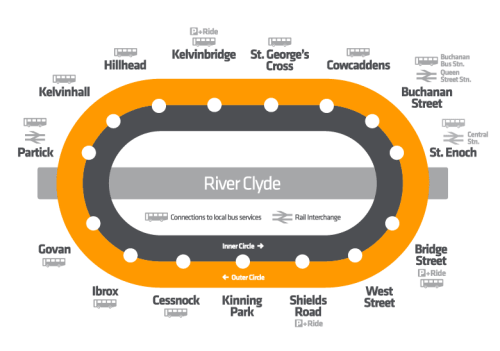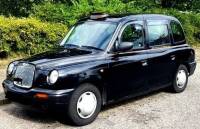Getting Around Glasgow
Don't forget Useful Travel Apps for your mobile device
Methods of Transport
Trains
Glasgow has an extensive and reliable train network that covers much of the city.
Primary Stations are Glasgow Central and Glasgow Queen Street. Both are mainline stations: Queen Street serving Edinburgh and the North of Scotland, with Central serving south of Glasgow and the West Coast main line to England. Both also serve extensive suburban networks.
The National Rail Enquiries Journey Planner is the easiest way to get times and costs for travel between two stations.
The SEC is served by the Exhibition Centre station1)2). This station has approximately 4 trains an hour to Glasgow Central and Argyle Street (for the city centre) and further East and 4 trains an hour to Partick (for the Subway) and further West.
To get to places near the subway from the SEC, it's easiest to go westward to Partick Station and directly exchange there.
The Subway
 If you or you destination is in the vicinity of a subway stop, it is just about the most convenient way to get around the city. The subway runs in both directions – an inner and an outer circle – from 0630 to 2340 Monday to Saturday, and from 1000 to 1812 on a Sunday. Services are approximately every 5-8 minutes.
If you or you destination is in the vicinity of a subway stop, it is just about the most convenient way to get around the city. The subway runs in both directions – an inner and an outer circle – from 0630 to 2340 Monday to Saturday, and from 1000 to 1812 on a Sunday. Services are approximately every 5-8 minutes.
The most convenient subway stop for the SEC is Partick. This is in the same station as Partick railway station, which is a direct connection from Exhibition Centre railway station at the SEC.
Subway stations are only accessible to those who can climb steps, with the aid or a handrail. It is is often very loud - in excess of 90dB. If you want to protect your hearing, earplugs or noise-cancelling headphones are advised.
Subway Tickets
Individual tickets are available: £1.75 single, £3.30 return, £4.20 all-day. Also available is a smart card, available from any ticket booth for £3, to which you can add credit to pay as you go. This discounts a single fare to £1.55 and all-day to £3.
Subway tickets combined with other methods of transport are available: see Integrated Transport passes below.
Buses
Glasgow's buses suffer from a lack of integration with the other public transport options in the city, ticketing is complex and the annunciators at bus stops indicate when they should arrive, not when they will. However they are accessible for wheelchairs and are less expensive than taxis.
There are two major bus companies serving the city: FirstBus and McGills. The former best serves journeys inside the city, and the latter best serves journeys from the cities to other towns surrounding Glasgow. From here on we'll be talking about FirstBus as it's the service you'll probably use.
In order to use them as easily as possible, it's best to have at least the FirstBus app. It has the advantage of live location updates from buses: which CityMapper and Apple and Google Maps don't have. The other thing to have is a contactless credit card, or Apple Watch. Using this to tap on when getting on the bus, and tap off when departing, will charge you the fare for the journey but additionally cap the fare to the lowest price of the course of a day / week. There are many other payment methods including cash, but this is the simplest.
Bus tickets are for the journey only: they do not include transfers. If you need to use more than one bus to get somewhere it's often best to get a day ticket, especially if you are returning by the same method.
Hail a bus by raising a hand or similar: they might not stop otherwise. Indicate you want the bus to stop at the next stop by pressing one of the bell buttons on the rails on the bus.
Buses allow service animals, have space for wheelchairs, have fold-down ramps and lowering suspensions. Most buses have the next street stop on a display toward the front of the bus. It's common for this not to be working. Drivers are OK with being asked to shout out when your stop is approaching.
Taxis
Taxis are most convenient for getting you to places otherwise not accessible by public transport. Post-COVID there are less taxi drivers in the city than previously, this can lead to unexpected delays; especially from busy locations and at busy times such as late at night.
The three main types of taxi are as follows:
Taxis should accept payment both by cash and by card. Often, taxis will make excuses for not taking card payments. Be polite but insistent3).
Black Cabs
 Black cabs are run by Glasgow Taxis. You can hail them from the kerb if they are showing the amber “for hire” light at the top of the windscreen. They can also be taken from taxi ranks.
Black cabs are run by Glasgow Taxis. You can hail them from the kerb if they are showing the amber “for hire” light at the top of the windscreen. They can also be taken from taxi ranks.
Black cabs will take you direct to your destination. The fare is set by time and distance and is metered. As well as hailing, taxis can be ordered either by calling their central booking number on 0141 429 7070 or using the Glasgow Taxis app.
While all black cabs must be wheelchair accessible, it is best to call and specifically book a wheelchair-accessible cab.
Private Hires
Private Hire taxis cannot be hailed from the street: they must be booked in advance either by phone or by app. They will also take you direct to your destination.
Glasgo Cabs are the largest firm of private hire taxis in the city. They can be ordered by either calling their central booking number on 0141 332 5050 or using the GlasGo app.
Uber
Uber also operate in Glasgow. Our experience is they are fewer of them than there used to be, and that they are only worth taking during normal pricing4). However, they still are convenient, especially if you already use them in your home location.
To call an Uber requires the use of the Uber app.
On Foot
Glasgow is a surprisingly compact city. If you are able and prepared to walk for half an hour or so, you can often skip public transport and walk to your destination — or walk to a more convenient form of public transport. Half an hour at regular walking speed will easily take you from the City Centre to Glasgow Central Station, or from one side of the city centre to the other.
Integrated Transport Passes
Glasgow suffers from a lack of integrated transport and ticketing. There are two primary options and neither are ideal. One is limited and one is only good if you're here for a week and is a pain to buy.
However, before we get to those, there is also the
Glasgow Conference Rover
This is certainly worth it if you intend to travel around a bit whilst here. Available to delegates attending conferences at the Scottish Exhibition and Conference Centre, it not only gives five days unlimited rail travel on all ScotRail services within the Conference Zone (bounded by Partick, High Street and Argyle Street, so covers the city centre) but also, if you fancy getting away for a trip to Edinburgh or Stirling, etc it gives up to a 50% discount on walk-up train tickets throughout Scotland purchased within the period of validity of the Rover. See https://www.scotrail.co.uk/tickets/conference-rover
Roundabout Ticket
The Roundabout Ticket is only valid after 9am on weekdays, and must be bought from staffed train or subway stations or from staff on the train. It gives unlimited all day travel on trains and the subway. It costs £7.40.
Zone Card
The ZoneCard gives unlimited travel on most forms of transport (with exceptions, the most relevant of which is night buses). The Zone Map will indicate which zones you will require. There's a minimium of two zones for one week, which costs £20.90. Zonecards are available from staffed rail stations and you will need to have a passport photo for the card. The major downside of a zonecard is that the week is fixed and runs from Sunday to Saturday. Unless you're staying before or after the convention, this probably makes it of less use.
Bus Week Ticket
Firstbus sell a Week Ticket but we don't recommend this: if you pay using a single credit or debit card then ticket costs are capped both daily and weekly.